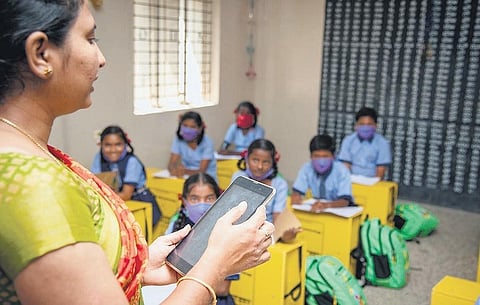

Among all the Covid warriors, humble schoolteachers have been at the forefront of Mission Study Possible. Take Soumya GL, a teacher at a Government Higher Primary School, in Shivamogga district, Karnataka. Determined that the 130 students in her village school continue their education, Soumya and her six colleagues have leveraged Bal Utsav’s e-learning programme, which has come to the aid of children thanks to Ramesh Balasundaram and Binu Verma. The two educators are co-founders and directors of the Bengaluru-based NGO which set up a network of internet-powered ‘Smart Schools’. Inspiration struck in 2008 after the two met on a mission to “give back to society” and quit their jobs. Their contribution to rural education is explained succinctly by Shekharappa Gowda, a village pramukh in the district, “Rich people build temples but what can a poor man do?”
Bal Utsav did it with startup flair. Its iShaala came up with online “temples of education” in 2016, which was piloted in 2017. The portal was formally launched in April 2019. After the first Covid-19 wave, Bal Utsav’s government schools in Shivamogga district and neighbouring villages saw an approximately 15 percent increase in enrollment. iShaala equipped small town schools in Kallahalli, Dummalli, and Nidige with Smart TVs with pre-loaded educational content. Teachers received tablets to conduct classes within the community. Some children used their cellphones to study at home. Families which owned smartphones were given licences to download syllabus. As a result, various schools witnessed reverse migration—kids in districts moving to government schools from private institutions.
“Bal Utsav is the coming together of ‘Bal’ and ‘Utsav’ (child and celebration). We promised ourselves that our work will be fuelled by the hopes of the 400-plus million schoolchildren of India, stranded by the pandemic,” exults Balasundaram. The NGO believes that they can solve tomorrow’s problems by working with today’s children. Currently, the startup has implemented a blended learning model—it makes use of physical teaching and internet-based teaching—in more than 100 government schools in Karnataka. “We believe that a quality learning environment is critical to increasing students’ enrollment, attendance, engagement and overall learning. So we repair, renovate and maintain schools so that students have a healthy place,” elaborates Verma.
The beneficiaries are aged up to 18 years. Scholarships are given to the top one percent from the economically weaker sections to study till their post-graduation. Besides, the group operates a teacher development programme through workshops and personalised coaching. “We equip teachers with innovative, interactive methodologies,” says Verma, adding, “Our goal is to establish at least one school in every district in India.” These eduprenuers have made a significant dent in the public education space. They have demonstrated that government schools can be model schools and the real education powerhouses of rural India.
BEST OF TWO WORLDS
Bal Utsav blends technology with teacher-enabled classrooms and is also designed for schools in remote villages where the teacher to class ratio is extremely low. The transition made by Bal Utsav in rural government schools began in December 2020 by anticipating closures in the backdrop of the second pandemic wave. The NGO has two programmes—Sampoorna Shaala and iShaala. The first is designed for large schools with over 500 students, while iShaala is designed for schools with under 100 students.